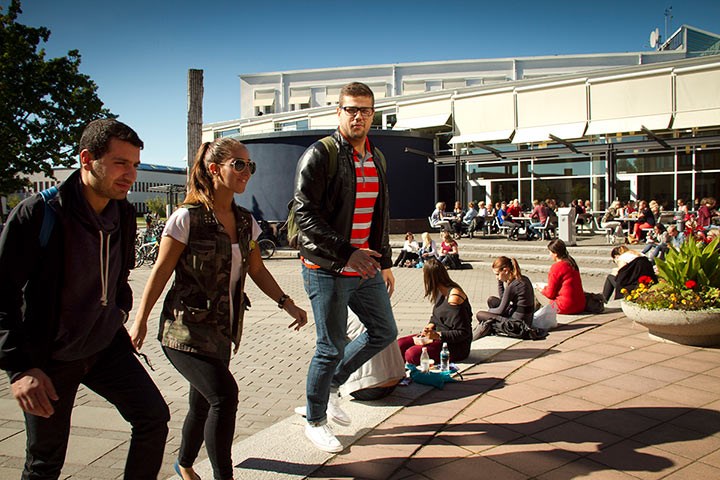CESSS - Center for Environmental and Sustainability Social Science

About
Environment information
Contact
Environmental- and climate problems pose serious challenges to society and the need for social change and sustainable transformation has been emphasized by science as well as policy institutions such as the United Nation. Social science research contributes with crucial knowledge and expertise necessary for a transformation of society towards a sustainable future.
The Center for Environmental and Sustainability Social Science (CESSS) constitute a platform that brings together and creates synergies between environmental and sustainability researchers within the social sciences. The aim is to strengthen social science research about environmental and sustainability issues at Örebro University. CESSS emerges from a long history of initiatives and collaborations within the social sciences at Örebro University that lays a solid foundation for the environment’s multidisciplinary collaboration.
CESSS works to enable a constructive and inclusive research environment that facilitates long-term research collaboration and development across disciplinary boundaries. CESSS is led by Karin Gustafsson, associate professor in sociology, and Carolin Zorell, associate professor in political science.
Using Transformative agency as a thematic umbrella concept, CESSS conducts research within three interrelated themes
- Theme 1; Public engagement concerning environmental and sustainability issues
- Theme 2; Environmental governance and the state
- Theme 3; Knowledge production, environmental expertise, and learning
CESSS’s work includes:
- To support the development of multi-disciplinary research projects and programs of high quality.
- To facilitate research collaborations in the field of environmental and sustainability studies, among both university researchers and external actors.
- To arrange internal CESSS conferences and international research workshops.
- To organize a multi-disciplinary seminar series open for researchers from other disciplines than sociology, psychology political science, as well as for practitioners with an interest in environmental and sustainability social science. More information on this will be posted here later.
The research environment collaborates with ESERGO - Environmental and Sustainability Education Research Group Örebro. ESERGO works with empirical and theoretical studies on environmental and sustainability education, with specific focus on the ethical and political aspects of this education.
Researchers
- Malin Ah-King
- Ida Andersson
- Dag Balkmar
- Monika Berg
- Peter Berglez
- Camilla Berglund
- Magnus Boström
- Åsa Callmer
- Dominik Döllinger
- Ingemar Elander
- Carina Green
- Karin Gustafsson
- Erik Hysing
- Sara Karimzadeh
- Sammyh Khan
- Kim Khavar Fahlstedt
- Ole Martin Laegreid
- Rolf Lidskog
- Martin Lind
- Erik Löfmarck
- Joakim Norberg
- Maria Ojala
- Ulrika Olausson
- Jan Olsson
- Hogne Sataoen
- Linda Soneryd
- Adam Standring
- Louise Sund
- Asgeir Tryggvason
- Ylva Uggla
- Carolin Zorell
- Johan Öhman
- Lisa Broberg, PhD student
- Bálint Kronstein, PhD student
- Friederike Küchler, PhD student
- Alessandra Paiusco, PhD student
- Amanda Rikner Martinsson, PhD student
- Helena Römmelmann, PhD student
- Julia Schneider, PhD student
- Linnea Urberg, PhD student
- Sandra Österlund, PhD student
Research projects
Active projects
- (Un)sustainable lifestyles: social (im)possibilities to consume less
- A wicked problem occupation: exploring how climate change scientists identify and cope with their professional work
- Challenges and opportunities of the sharing economy
- Conceptual development of environmental sociology
- Divine Ganges, Profane Development: Sacred Geographies and the Governing of Pollution
- Effects of re-scaling for sustainable transformation. 10 years with regional transportation authorities as strategic spatial planners.
- Integration of road safety in sustainability transformation at the local and regional levels in Sweden
- Learning to consume less: Can experiences during the C ovid-19 pandemic trigger lifestyle transformation?
- Multi-level learning journeys for green and just regional transfromations
- Prefiguring sustainable futures through food activism: How young people deal with border tensions between the sustainable and unsustainable in everyday life
- Reconciling safe and circular material flows - a case study of PFAS in the lifecycle of food packaging
- Social (im)possibilities of the formation of ethical consumption: A comparative study of Sweden and Iran
- The logic of measuring, managing and governing ecosystems (EcoLogic)
- To trust or not to trust? Youth's attitudes, emotions, and trust in climate change science
- What role does climate change worry play in young people?s life and learning processes? A longitudinal study


